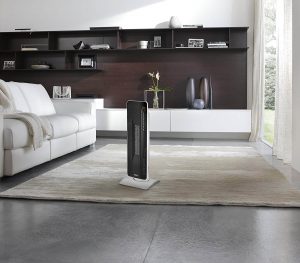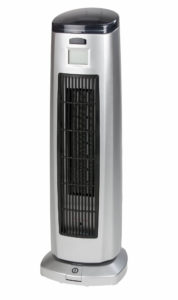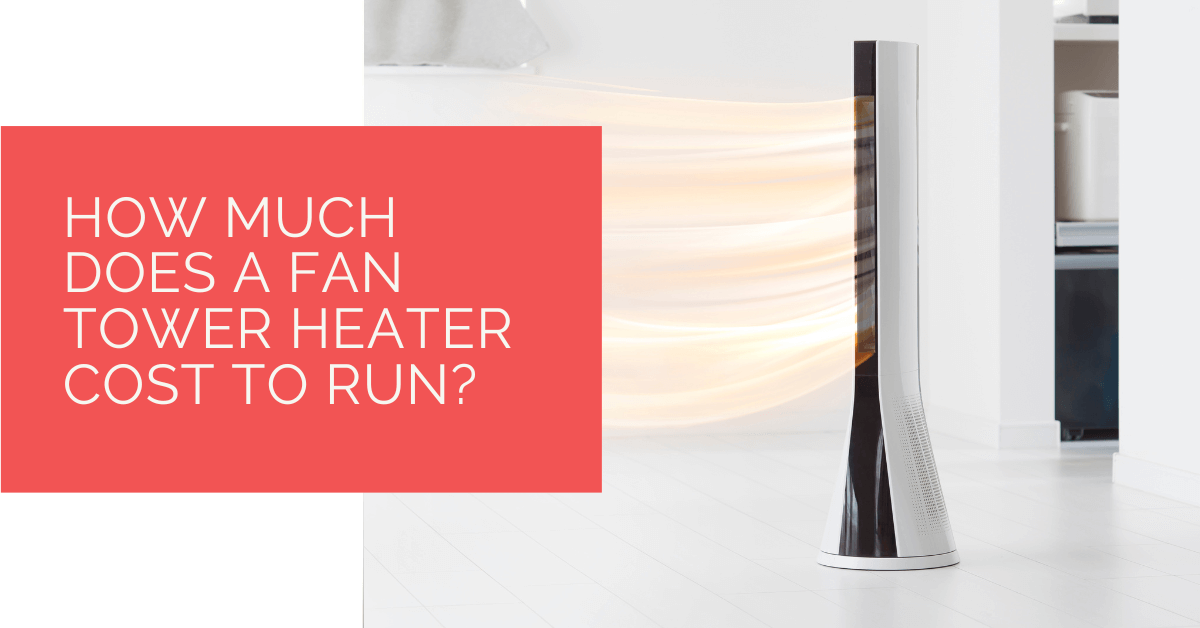Gone are the days when a simple room heater was the only solution to warm your frozen dwellings. Now the same function is done faster and more efficiently by a fan tower heater– a device that uses air to heat your home.
These heaters can be an expensive way to keep you and your family warm, especially if you live in an area where temperatures take deep dive for several months of the year.
Fan tower heaters are an affordable and effective way of heating your entire house if done wisely.
This article will discuss how much tower fan heaters cost to run, their advantages and disadvantages, and how are they different from traditional heating appliances.
Contents
Key Takeaways
- Fan tower heaters are an efficient way to heat your home, but their running costs depend on factors like the heater’s size and usage duration. Larger heaters and heating entire houses can lead to higher electricity bills.
- Fan tower heaters differ from traditional heating systems regarding energy efficiency and compactness. They can be more cost-effective and provide constant temperatures without emitting harmful substances.
- Pros of fan tower heaters include affordability, energy efficiency, portability, and the ability to use different heat sources. However, they may not be suitable for larger rooms or high ceilings, and some models can be noisy.
What is a Fan Tower Heater?
A fan tower heater is an electric heater that uses a fan to circulate air through the heating element. There is a simple metal coil or ceramic piece, and these are located at the base of the unit. The unit may have an internal blower or an external blower connected via a flexible duct.
A fan tower heater works best with adequate airflow to create positive pressure within the room; they are commonly used in warehouses and other large buildings.
How to Calculate the Running Costs of a Fan Tower Heater
The running costs of an fan tower heater are calculated using a simple equation:
Power (in Kilowatt) x Hours of use x Pence per kWh
However, it is vital to note that this equation can give us only an approximate cost. It does not take into consideration any external factors affecting the cost.
Before calculating the approximate cost, convert the wattage of the fan tower heater into Kilowatts by simply dividing it by 1000. For instance, a 2000W fan tower heater is essentially a 2kW heater.
As per the Energy Savings Trust, take an example price per pence/kWh of 20.33p.
In this example, let us assume that the average rate of a single unit of energy is 20p (rounded off to the nearest whole number).
The fan tower heater is 2kW and is run for approximately 2 hours. Multiplying these two gives us the daily cost of 80p per day.
To calculate the cost per month, multiply it by 30 (average number of days in a month). You get £24.
To calculate the cost per year, multiply it by 365 (number of days in a year). The annual cost comes up to £292 pounds a year.

How Much Does a Fan Tower Heater Cost?
A fan tower heater is a great way to heat a home or building, but it can get costly to run. The exact costs will depend on the size of your fan tower.
The larger the fan tower, the more expensive it will run. The amount of heat you get from your fan tower will affect how much you spend on electricity. A bigger fan tower that provides more warmth will cost more to run than a smaller one.
It will not use much electricity, primarily if you only heat a small room. If you are heating an entire house with one of these units, the cost of running it will be more significant.
It is also important to note that these units tend to get hot when they are in use, so if you have young children or pets in your home, they should not be allowed near the unit while it is on.
How Are Fan Tower Heaters Different from Traditional Heaters?
Fan tower heaters are a new heating system that can save you money. Traditional heating systems, such as forced air units and baseboards, use energy to power fans that distribute warm air throughout the house. In contrast, fan tower heaters produce warm air through convection heating. They are great for smaller homes because they are more compact than forced air units.
Comparing the costs of traditional heating systems vs fan tower heaters, you will find that these modern devices are more affordable and more efficient than conventional heating systems, and they are good energy savers.
If you plan to purchase a new heating system, keep in mind that the costs of running it might be considerably lower with a fan tower heater. So, you will make fewer expenses on utility bills each month.
This is not the only advantage of these devices – they also provide you with a constant temperature and do not emit any harmful substances.
Pro Tip:
If your home is in poor condition, you may not see any savings at all with a fan tower heater. To get the most of your fan tower heater, it’s crucial to maintain the integrity of your home’s walls and floors.

Pros and Cons of Using a Fan Tower Heater
A fan tower heater is also known as a blower heater. Blower heaters are increasingly popular in many countries, including Singapore, Australia, America and Canada. They have their benefits and drawbacks. Fan tower heaters are made up of a fan and a heater.
Let’s read to understand their merits and demerits.
Pros
If you’re looking for an inexpensive and energy-efficient way to heat your home, a fan heater is a perfect solution. Most people choose them because they are so cheap and easy to use.
They are also relatively lightweight, making them easy to move around if necessary. Some models even come with wheels for added convenience. These heaters can produce power via different heat sources.
Many of these types of heaters can be operated using batteries and electricity. That means that you can take them with you on camping trips or to places where electricity is unavailable.
You may be surprised to learn that fan heaters are more efficient than many other types of heaters. They use a lot less energy and don’t put out as much carbon dioxide.
Cons
While a fan heater can be a great asset to your home, there are some things you should know before you buy one.
Firstly, they’re not designed for larger rooms or areas that need a lot of heat. You may find yourself buying several units to keep warm in a large room.
Secondly, they don’t work as well if you have high ceilings. They only put out so much heat and will have trouble warming up high spaces without the help of ducting.
Finally, you may find that they are noisy. While this is more common with cheap models, some people may find it problematic. However, the noise levels vary greatly depending on the model and brand you buy. Some models even have sound insulation to help make them quieter.
Heat Pump Source: Reliable Heating and Cooling Solutions
At Heat Pump Source, we take pride in our unwavering commitment to serving the UK community with top-tier HVAC solutions. From the efficiency of heat pumps and the cool relief of air conditioning to the warmth of boilers, radiators, and underfloor heating, our dedicated team is always at the forefront of innovation. We understand the unique needs of every household and business, and we strive to provide dependable health and cooling products and services that are tailored just for you. Ensuring your comfort and satisfaction is our utmost priority. Whether you have questions, need guidance, or require support, we’re always here to assist. Please don’t hesitate to contact us; we’re eager to be of service.
To Sum Up
With the detailed overview, you can find the fan tower heater that is perfect for your needs. We hope our little guide has been helpful to you!
About the Author
At Heat Pump Source, our articles are the product of a collaborative effort among a team of highly skilled HVAC experts. Our dedicated professionals, hailing from diverse backgrounds in heating, ventilation, air conditioning, and refrigeration, contribute their extensive knowledge and experience to every piece of content. This multidisciplinary approach ensures comprehensive coverage. Our commitment is to deliver authoritative, reliable, and tailored advice to meet the unique needs of every household and business across the UK.

